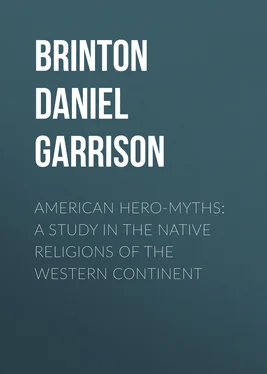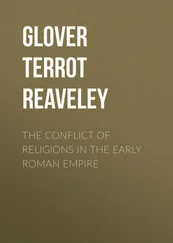Daniel Brinton - American Hero-Myths - A Study in the Native Religions of the Western Continent
Здесь есть возможность читать онлайн «Daniel Brinton - American Hero-Myths - A Study in the Native Religions of the Western Continent» — ознакомительный отрывок электронной книги совершенно бесплатно, а после прочтения отрывка купить полную версию. В некоторых случаях можно слушать аудио, скачать через торрент в формате fb2 и присутствует краткое содержание. Жанр: foreign_prose, История, Мифы. Легенды. Эпос, foreign_edu, foreign_antique, на английском языке. Описание произведения, (предисловие) а так же отзывы посетителей доступны на портале библиотеки ЛибКат.
- Название:American Hero-Myths: A Study in the Native Religions of the Western Continent
- Автор:
- Жанр:
- Год:неизвестен
- ISBN:нет данных
- Рейтинг книги:4 / 5. Голосов: 1
-
Избранное:Добавить в избранное
- Отзывы:
-
Ваша оценка:
- 80
- 1
- 2
- 3
- 4
- 5
American Hero-Myths: A Study in the Native Religions of the Western Continent: краткое содержание, описание и аннотация
Предлагаем к чтению аннотацию, описание, краткое содержание или предисловие (зависит от того, что написал сам автор книги «American Hero-Myths: A Study in the Native Religions of the Western Continent»). Если вы не нашли необходимую информацию о книге — напишите в комментариях, мы постараемся отыскать её.
American Hero-Myths: A Study in the Native Religions of the Western Continent — читать онлайн ознакомительный отрывок
Ниже представлен текст книги, разбитый по страницам. Система сохранения места последней прочитанной страницы, позволяет с удобством читать онлайн бесплатно книгу «American Hero-Myths: A Study in the Native Religions of the Western Continent», без необходимости каждый раз заново искать на чём Вы остановились. Поставьте закладку, и сможете в любой момент перейти на страницу, на которой закончили чтение.
Интервал:
Закладка:
The outlines of this legend are to the effect that in some exceedingly remote time this divinity took an active part in creating the world and in fitting it to be the abode of man, and may himself have formed or called forth the race. At any rate, his interest in its advancement was such that he personally appeared among the ancestors of the nation, and taught them the useful arts, gave them the maize or other food plants, initiated them into the mysteries of their religious rites, framed the laws which governed their social relations, and having thus started them on the road to self development, he left them, not suffering death, but disappearing in some way from their view. Hence it was nigh universally expected that at some time he would return.
The circumstances attending the birth of these hero-gods have great similarity. As a rule, each is a twin or one of four brothers born at one birth; very generally at the cost of their mother's life, who is a virgin, or at least had never been impregnated by mortal man. The hero is apt to come into conflict with his brother, or one of his brothers, and the long and desperate struggle resulting, which often involved the universe in repeated destructions, constitutes one of the leading topics of the myth-makers. The duel is not generally–not at all, I believe, when we can get at the genuine native form of the myth–between a morally good and an evil spirit, though, undoubtedly, the one is more friendly and favorable to the welfare of man than the other.
The better of the two, the true hero-god, is in the end triumphant, though the national temperament represented this variously. At any rate, his people are not deserted by him, and though absent, and perhaps for a while driven away by his potent adversary, he is sure to come back some time or other.
The place of his birth is nearly always located in the East; from that quarter he first came when he appeared as a man among men; toward that point he returned when he disappeared; and there he still lives, awaiting the appointed time for his reappearance.
Whenever the personal appearance of this hero-god is described, it is, strangely enough, represented to be that of one of the white race, a man of fair complexion, with long, flowing beard, with abundant hair, and clothed in ample and loose robes. This extraordinary fact naturally suggests the gravest suspicion that these stories were made up after the whites had reached the American shores, and nearly all historians have summarily rejected their authenticity, on this account. But a most careful scrutiny of their sources positively refutes this opinion. There is irrefragable evidence that these myths and this ideal of the hero-god, were intimately known and widely current in America long before any one of its millions of inhabitants had ever seen a white man. Nor is there any difficulty in explaining this, when we divest these figures of the fanciful garbs in which they have been clothed by the religious imagination, and recognize what are the phenomena on which they are based, and the physical processes whose histories they embody. To show this I will offer, in the most concise terms, my interpretation of their main details.
The most important of all things to life is Light . This the primitive savage felt, and, personifying it, he made Light his chief god. The beginning of the day served, by analogy, for the beginning of the world. Light comes before the sun, brings it forth, creates it, as it were. Hence the Light-God is not the Sun-God, but his Antecedent and Creator.
The light appears in the East, and thus defines that cardinal point, and by it the others are located. These points, as indispensable guides to the wandering hordes, became, from earliest times, personified as important deities, and were identified with the winds that blew from them, as wind and rain gods. This explains the four brothers, who were nothing else than the four cardinal points, and their mother, who dies in producing them, is the eastern light, which is soon lost in the growing day. The East, as their leader, was also the supposed ruler of the winds, and thus god of the air and rain. As more immediately connected with the advent and departure of light, the East and West are twins, the one of which sends forth the glorious day-orb, which the other lies in wait to conquer. Yet the light-god is not slain. The sun shall rise again in undiminished glory, and he lives, though absent.
By sight and light we see and learn. Nothing, therefore, is more natural than to attribute to the light-god the early progress in the arts of domestic and social life. Thus light came to be personified as the embodiment of culture and knowledge, of wisdom, and of the peace and prosperity which are necessary for the growth of learning.
The fair complexion of these heroes is nothing but a reference to the white light of the dawn. Their ample hair and beard are the rays of the sun that flow from his radiant visage. Their loose and large robes typify the enfolding of the firmament by the light and the winds.
This interpretation is nowise strained, but is simply that which, in Aryan mythology, is now universally accepted for similar mythological creations. Thus, in the Greek Phoebus and Perseus, in the Teutonic Lif, and in the Norse Baldur, we have also beneficent hero-gods, distinguished by their fair complexion and ample golden locks. "Amongst the dark as well as amongst the fair races, amongst those who are marked by black hair and dark eyes, they exhibit the same unfailing type of blue-eyed heroes whose golden locks flow over their shoulders, and whose faces gleam as with the light of the new risen sun." [5] [ Footnote 5 : Sir George W. Cox, An Introduction to the Science of Comparative Mythology and Folk-Lore , p. 17.] [ Footnote 6 : Sir George W. Cox, Ibid. , p. 76.] [ Footnote 7 : See Dr. C.P. Tiele, History of the Egyptian Religion , pp. 93, 95, 99, et al.] [ Footnote 8 : "Τον εμον Χιτωνα ουδεις απεχαλυφεν ον εγω χαρπον ετεχαν, ηλιος εγενετο." (Greek: Ton emon chitona oudeis apechaluphen on ego charpon etechan, aelios egeneto.)]" Proclus, quoted by Tiele, ubi suprá, p. 204, note.]
Everywhere, too, the history of these heroes is that of a struggle against some potent enemy, some dark demon or dragon, but as often against some member of their own household, a brother or a father.
The identification of the Light-God with the deity of the winds is also seen in Aryan mythology. Hermes, to the Greek, was the inventor of the alphabet, music, the cultivation of the olive, weights and measures, and such humane arts. He was also the messenger of the gods, in other words, the breezes, the winds, the air in motion. His name Hermes, Hermeias, is but a transliteration of the Sanscrit Sarameyas, under which he appears in the Vedic songs, as the son of Sarama, the Dawn. Even his character as the master thief and patron saint of the light-fingered gentry, drawn from the way the winds and breezes penetrate every crack and cranny of the house, is absolutely repeated in the Mexican hero-god Quetzalcoatl, who was also the patron of thieves. I might carry the comparison yet further, for as Sarameyas is derived from the root sar , to creep, whence serpo , serpent, the creeper, so the name Quetzalcoatl can be accurately translated, "the wonderful serpent." In name, history and functions the parallelism is maintained throughout.
Or we can find another familiar myth, partly Aryan, partly Semitic, where many of the same outlines present themselves. The Argive Thebans attributed the founding of their city and state to Cadmus. He collected their ancestors into a community, gave them laws, invented the alphabet of sixteen letters, taught them the art of smelting metals, established oracles, and introduced the Dyonisiac worship, or that of the reproductive principle. He subsequently left them and lived for a time with other nations, and at last did not die, but was changed into a dragon and carried by Zeus to Elysion.
Читать дальшеИнтервал:
Закладка:
Похожие книги на «American Hero-Myths: A Study in the Native Religions of the Western Continent»
Представляем Вашему вниманию похожие книги на «American Hero-Myths: A Study in the Native Religions of the Western Continent» списком для выбора. Мы отобрали схожую по названию и смыслу литературу в надежде предоставить читателям больше вариантов отыскать новые, интересные, ещё непрочитанные произведения.
Обсуждение, отзывы о книге «American Hero-Myths: A Study in the Native Religions of the Western Continent» и просто собственные мнения читателей. Оставьте ваши комментарии, напишите, что Вы думаете о произведении, его смысле или главных героях. Укажите что конкретно понравилось, а что нет, и почему Вы так считаете.







![Hubert Bancroft - The Native Races [of the Pacific states], Volume 5, Primitive History](/books/749157/hubert-bancroft-the-native-races-of-the-pacific-s-thumb.webp)



![Hubert Bancroft - The Native Races [of the Pacific states], Volume 1, Wild Tribes](/books/750126/hubert-bancroft-the-native-races-of-the-pacific-s-thumb.webp)
